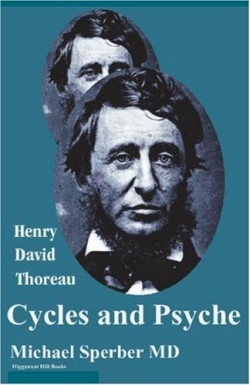Henry David Thoreau
Cycles and Psyche
Is it legitimate to view an icon of a bygone era through the lens of modern psychiatry? In this case it is, because of what Thoreau revealed about himself and because the author avoids the pitfalls of pathography-facile diagnosis and tidy explanation of creative genius-keeping to the high ground, respectful of Thoreau’s warning to himself: “Being is the great explainer. In the attempt to explain, shall I plane away all the spines, till it is no thistle, but a cornstalk?”
To mark the sesquicentennial of Walden (1854), Sperber, a Massachusetts psychiatrist who both trained and taught at Harvard Medical School, analyzes its author through his books, journals, letters, dreams, and drawings. In a small space, Sperber carefully arranges some examples of the verbal jewels that make Thoreau a national treasure. His remarkably cooperative patient was never seen by Sperber, who was born seventy years after Thoreau’s death (in 1862, at age forty-six).
Does it matter whether Thoreau suffered from bipolar (manic-depressive) illness? Perhaps, if the information contributes to useful understanding of the man, his times, and his achievement, and gives comfort to fellow sufferers. The details of Thoreau’s difficult life make these pages alternately bright and dark; thoughts and feelings sampled from his sometimes hypergraphic (manically written) journals flesh out the profile of a grieving but also ecstatic man whose genius joins elegance to plainness and speaks in bold, quiet, proud, humble, sublime, and earthy sentences.
The reader gains an appreciation of the uses and limits of psychiatric science and the psychological approach to art. Sperber uses the Icarus complex, introduced by Henry A. Murray, and adds a Daedalus theme: Icarus ignores his father’s warning, flies too high, and melts his wings. Thoreau’s ups and downs combine Daedalian (Thoreau’s word) and Icarian motifs. Sperber concerns himself as much with Henry’s self-therapy as with his disabilities. Thoreau documented his own mood swings and diagnosed his own “insanity” but wrote about the “sanative” elements in life. “If I am well, then I see well. The bulletins of health are twirled along my visual rays, like pasteboards on a kite string.”
A sexual ascetic, Thoreau loved nature and music but mostly disparaged women. While Sperber runs the gamut of possible psychiatric diagnoses, with inevitable leaps of speculation, his probings will not diminish his subject, whose own words add life and meaning to phrases like “bipolar illness” and “post-traumatic stress disorder.” Writing, walking, observing, and willing all evolved in Thoreau’s self-therapy. Sperber’s insights enhance that writing, which served as grief-work for a lost brother and self-defense of a sensitive soul.
Reviewed by
E. James Lieberman
Disclosure: This article is not an endorsement, but a review. The publisher of this book provided free copies of the book to have their book reviewed by a professional reviewer. No fee was paid by the publisher for this review. Foreword Reviews only recommends books that we love. Foreword Magazine, Inc. is disclosing this in accordance with the Federal Trade Commission’s 16 CFR, Part 255.

